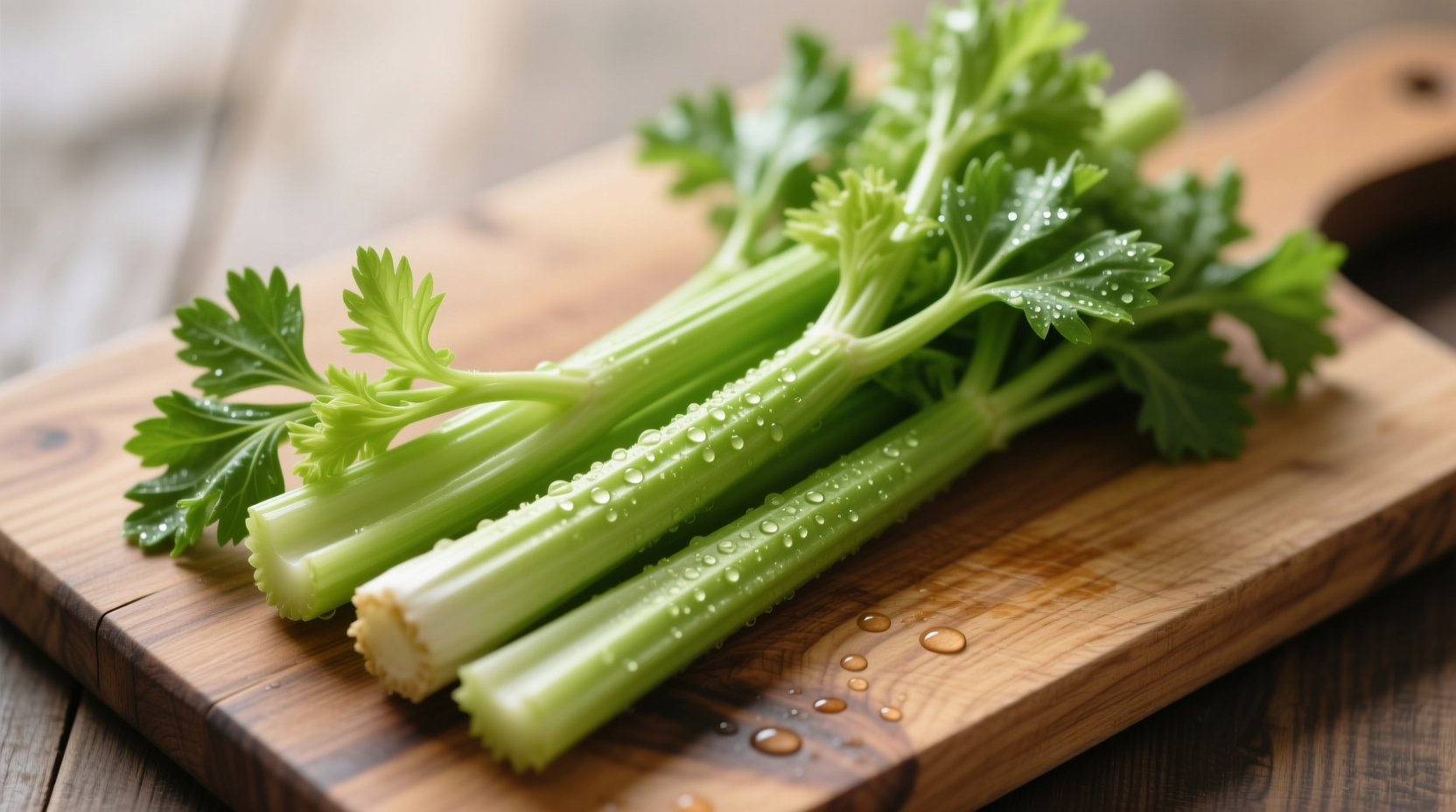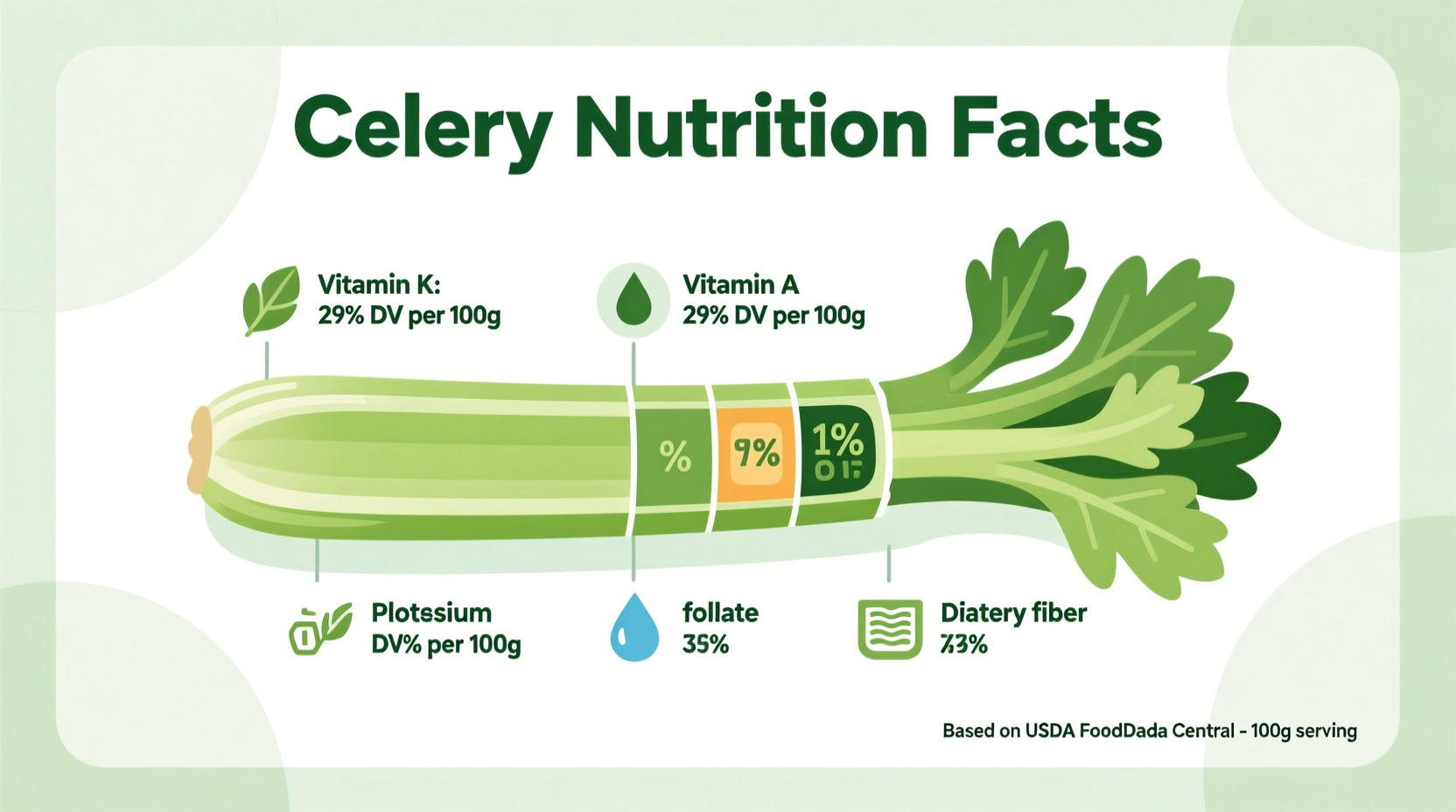One medium celery stalk (40g) contains just 6 calories, 0.3g fiber, and delivers 5% of your daily vitamin K needs. This crunchy vegetable is 95% water, making it an excellent hydrating food with notable amounts of vitamin A, potassium, and antioxidants like apigenin.
Discover exactly what makes celery a nutritional powerhouse despite its humble appearance. Whether you're tracking macros, managing weight, or simply curious about this common vegetable, you'll get precise, science-backed information you can trust. We've analyzed the latest USDA data and peer-reviewed research to give you the complete picture of celery's nutritional profile and practical health benefits.
Breaking Down Celery's Nutritional Profile
Understanding celery's nutritional composition helps you make informed dietary choices. While often overlooked, this versatile vegetable offers more than just crunch. Let's examine what's really inside one of nature's most hydrating foods.
| Nutrient | Per 100g | Per Medium Stalk (40g) | % Daily Value* |
|---|---|---|---|
| Calories | 16 kcal | 6 kcal | <1% |
| Total Fat | 0.2g | 0.1g | <1% |
| Carbohydrates | 3g | 1.2g | <1% |
| Dietary Fiber | 1.6g | 0.3g | 1% |
| Sugar | 1.3g | 0.5g | - |
| Protein | 0.7g | 0.3g | 1% |
| Vitamin K | 29.6μg | 11.8μg | 12% |
| Vitamin A | 22μg | 8.8μg | 1% |
| Potassium | 260mg | 104mg | 3% |
*Percent Daily Values based on a 2,000 calorie diet. Source: USDA FoodData Central, 2023
Key Nutrients That Make Celery Worth Adding to Your Diet
Celery's nutritional value extends far beyond its low calorie count. This vegetable contains several important compounds that contribute to overall health:
Vitamin K for Bone Health and Blood Clotting
Just one cup of chopped celery provides approximately 30% of your daily vitamin K requirement. This fat-soluble vitamin plays a crucial role in blood clotting and bone metabolism. Research published in the Journal of Nutrition and Metabolism indicates adequate vitamin K intake supports bone density and may reduce fracture risk.
Potassium for Blood Pressure Management
With 260mg of potassium per 100g, celery contributes to your daily intake of this essential mineral. Potassium helps balance sodium levels in the body and supports healthy blood pressure. The American Heart Association recommends potassium-rich foods as part of a heart-healthy diet.
Antioxidant Powerhouse: Apigenin and Luteolin
Celery contains significant amounts of apigenin, a flavonoid with potential anti-inflammatory properties. According to research from the National Institutes of Health, apigenin may help reduce oxidative stress and support cellular health. Luteolin, another antioxidant in celery, shows promise in supporting brain health according to recent studies.

Celery Nutrition Through the Years: Scientific Understanding Evolution
Our understanding of celery's nutritional value has evolved significantly over time. This timeline shows key discoveries that shaped our current knowledge:
| Time Period | Key Discoveries | Nutritional Understanding |
|---|---|---|
| 1950s-1970s | Basic vitamin and mineral analysis | Recognized as low-calorie food with vitamin K and potassium |
| 1980s-1990s | Identification of phthalides | Discovered compounds that may help lower blood pressure |
| 2000s | Antioxidant research expands | Identification of apigenin and luteolin as key beneficial compounds |
| 2010s-Present | Molecular studies on bioactive compounds | Understanding how celery components interact with human physiology |
This progression shows how scientific methods have revealed celery's nutritional complexity beyond basic vitamin content. Modern research focuses on how celery's compounds work synergistically in the body.
Practical Applications: Maximizing Celery's Nutritional Benefits
Knowing celery's nutrition facts is only valuable if you can apply this information to your daily life. Here's how to get the most from this vegetable:
Preserving Nutrients During Preparation
To maintain maximum nutritional value:
- Wash but don't peel celery stalks (nutrients concentrate near the skin)
- Store in the refrigerator in a sealed container with a damp paper towel
- Consume within 1-2 weeks for peak freshness and nutrient retention
- Include the leaves (they contain higher concentrations of certain nutrients)
Celery in Weight Management Strategies
With only 16 calories per 100g, celery makes an excellent addition to weight management plans. Registered dietitians often recommend it as a "negative calorie" food because the energy required to digest it may exceed its caloric content. Pair celery with healthy fats like almond butter to enhance absorption of fat-soluble vitamins.
Celery Nutrition Compared to Similar Vegetables
How does celery stack up against other common vegetables? This comparison helps you make informed choices based on your nutritional goals:
| Nutrient (per 100g) | Celery | Cucumber | Carrot | Bell Pepper |
|---|---|---|---|---|
| Calories | 16 | 15 | 41 | 31 |
| Vitamin A | 22μg | 5μg | 835μg | 180μg |
| Vitamin K | 29.6μg | 16.4μg | 13.2μg | 7.4μg |
| Potassium | 260mg | 147mg | 320mg | 211mg |
| Dietary Fiber | 1.6g | 0.5g | 2.8g | 2.1g |
While carrots lead in vitamin A and fiber, celery provides superior vitamin K content compared to cucumbers and bell peppers. Each vegetable offers unique nutritional advantages, making variety essential in a balanced diet.
Important Context: When Celery Nutrition Has Limitations
Understanding the boundaries of celery's nutritional profile helps you make informed dietary decisions:
- Low protein content: Not suitable as a protein source (only 0.7g per 100g)
- Limited vitamin C: Contains only trace amounts compared to citrus or bell peppers
- Hydration focus: While 95% water content aids hydration, it shouldn't replace electrolyte-rich fluids during intense exercise
- Nitrate considerations: Naturally occurring nitrates may concern individuals with specific health conditions
Registered dietitians emphasize that celery works best as part of a varied diet rather than a standalone nutritional solution. Its greatest value comes from complementing other nutrient-dense foods.
Putting Celery Nutrition Facts Into Practice
Now that you understand celery's nutritional profile, here are three practical ways to incorporate it into your daily routine:
- Morning hydration boost: Start your day with celery juice (made from 3-4 stalks) to kickstart hydration and provide morning nutrients
- Smart snacking: Pair celery sticks with 1 tablespoon of natural almond butter for balanced macronutrients
- Cooking enhancement: Add chopped celery to soups, stews, and stir-fries as a flavor base that contributes nutrients without excess calories
These simple strategies help you leverage celery's nutritional advantages while enjoying its crisp texture and mild flavor.











 浙公网安备
33010002000092号
浙公网安备
33010002000092号 浙B2-20120091-4
浙B2-20120091-4